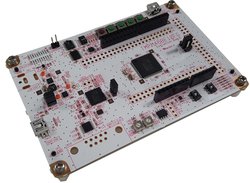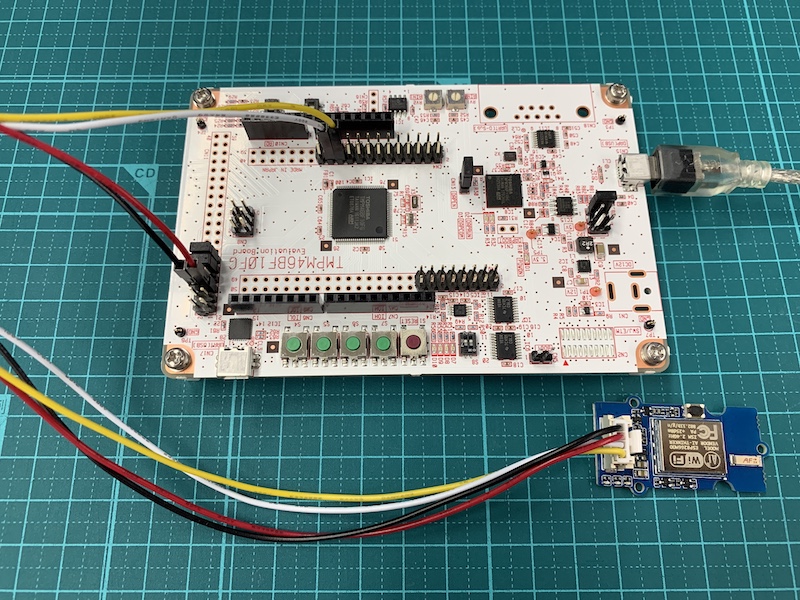Mbed OS example of Pelion device management client
This example is known to work great on the following platforms:
- AdBun-M46B over Wi-Fi.

To use this example, connect ESP8266 Wi-Fi module (Grove UART WiFi) to the AdBun-M46B board as below:
| ESP8266 Wi-Fi | AdBun-M46B |
|---|---|
| TX | PL1 (CN4-22) |
| RX | PL2 (CN4-24) |
| VIN | VCC3.3 (CN11-5) |
| GND | GND (CN11-6) |

Example functionality
- Initialize, connect and register to Pelion DM
- Interact with the user through the serial port (115200 bauds)
- Press enter through putty/minicom to simulate button
- Press i to print endpoint name
- Press Ctrl-C to to unregister
- Press r to reset storage and reboot (warning: it generates a new device ID!)
Instructions to use this program with Mbed CLI
1. Import the application into your desktop:
mbed import https://os.mbed.com/teams/Toshiba/code/mbed-os-example-pelion/ cd mbed-os-example-pelion
2. Install the CLOUD_SDK_API_KEY
mbed config -G CLOUD_SDK_API_KEY <PELION_DM_API_KEY>
For instructions on how to generate your API key, please see the documentation.
3. Initialize firmware credentials (done once per repository). You can use the following command:
mbed dm init -d "<your company name in Pelion DM>" --model-name "<product model identifier>" -q --force
If above command do not work for your Mbed CLI, please consider upgrading Mbed CLI to version 1.8.x or above.
4. Connect Pins used with Wifi shield (ESP8266) and SD card shield:
5. Edit mbed_app.json to specify Wi-Fi access point information
"nsapi.default-wifi-ssid" : "\"SSID\"",
"nsapi.default-wifi-password" : "\"PASSWORD\""
6. Compile and program:
mbed compile -t <toolchain> -m TMPM46B
(supported toolchains : GCC_ARM / ARM / IAR)
Diff: TESTS/pelion_helper.py
- Revision:
- 0:9f917a7bf2da
--- /dev/null Thu Jan 01 00:00:00 1970 +0000
+++ b/TESTS/pelion_helper.py Thu Dec 12 10:26:06 2019 +0900
@@ -0,0 +1,156 @@
+"""
+Copyright 2019 ARM Limited
+Licensed under the Apache License, Version 2.0 (the "License");
+you may not use this file except in compliance with the License.
+You may obtain a copy of the License at
+
+ http://www.apache.org/licenses/LICENSE-2.0
+
+Unless required by applicable law or agreed to in writing, software
+distributed under the License is distributed on an "AS IS" BASIS,
+WITHOUT WARRANTIES OR CONDITIONS OF ANY KIND, either express or implied.
+See the License for the specific language governing permissions and
+limitations under the License.
+"""
+
+# pylint: disable=missing-docstring,too-many-instance-attributes
+# pylint: disable=line-too-long,method-hidden
+
+import json
+import os
+import uuid
+import requests
+from mbed_cloud import AccountManagementAPI
+from mbed_cloud import ConnectAPI
+from mbed_cloud import DeviceDirectoryAPI
+from mbed_cloud import UpdateAPI
+from icetea_lib.bench import Bench
+from icetea_lib.bench import TestStepFail
+
+
+class PelionBase(Bench):
+ """
+ Base class containing common implementation shared by tests
+ """
+
+ def __init__(self, **kwargs):
+ Bench.__init__(self, **kwargs)
+ self.test_config = None
+ self.device_id = None
+ self.manifest_id = None
+ self.account_api = None
+ self.connect_api = None
+ self.device_api = None
+ self.update_api = None
+ self.rest_headers = None
+ self.rest_address = None
+ self.pattern_value1 = "1000:1000:1000:1000"
+ self.pattern_value2 = "2000:1000:2000:1000"
+ self.pattern_value3 = "3000:1000:3000:1000"
+ self.notified_value = ""
+
+ def setup(self):
+ # Check if API key is in environmental vars
+ if 'MBED_CLOUD_SDK_API_KEY' in os.environ:
+ api_key = (os.environ[str('MBED_CLOUD_SDK_API_KEY')])
+ else:
+ api_key = self.config.get("api_key")
+
+ if not api_key.startswith('ak_'):
+ raise TestStepFail("No API key in MBED_CLOUD_SDK_API_KEY or in pelion.tc_cfg")
+
+ self.device_id = self.config.get("device_id")
+ host = self.config.get("host")
+ self.test_config = {"api_key": api_key, "host": host}
+ self.account_api = AccountManagementAPI(self.test_config)
+ self.connect_api = ConnectAPI(self.test_config)
+ self.device_api = DeviceDirectoryAPI(self.test_config)
+
+ # Additional parameters for handling REST requests without SDK
+ self.rest_headers = {'Authorization': 'Bearer ' + api_key}
+ self.rest_address = self.config.get("host")
+
+ # Init delay due to internal usage of PULL notification in SDK. Notications might be lost between
+ # tests.
+ # TODO: Remove workaround after limitation in SDK has been fixed.
+ self.delay(5)
+
+ def setup_update(self):
+ self.manifest_id = self.config.get("manifest_id")
+ self.update_api = UpdateAPI(self.test_config)
+
+ def _callback_fn(self, device_id, path, value):
+ string = value.decode("utf-8")
+ self.logger.info("Notification for %s received: %r value: %r", device_id, path, string)
+ self.notified_value = string
+
+ def verify_registration(self, expected_state):
+ self.logger.info("Verify device to in state %s", expected_state)
+ device = self.device_api.get_device(self.device_id)
+ if device is None:
+ raise TestStepFail("device_id %s does not exist/is not listed in Device Directory" % self.device_id)
+ else:
+ if device.state == expected_state:
+ self.logger.info("Endpoint %s is in state: %s", self.device_id, expected_state)
+ else:
+ raise TestStepFail("Endpoint %s is in state %s, expected %s" % (self.device_id, device.state, expected_state))
+
+ def prepare_campaign_filter(self, state):
+ # Create filter for the update campaign. Here we only update one endpoint.
+ payload = {}
+ payload["device_filter"] = "id=" + self.device_id
+ payload["root_manifest_id"] = self.manifest_id
+ payload["name"] = str(uuid.uuid4())
+ payload["state"] = state
+ return payload
+
+ ## Function for starting a update campaign
+ ## TODO: Replace with Python SDK implementation
+ def post_campaign(self, payload):
+ req_address = self.rest_address + '/v3/update-campaigns'
+ res = requests.post(req_address, json=payload, headers=self.rest_headers)
+ if res.status_code == 409:
+ # Endpoint can be targeted by only one active campaign. The older campaign must be deleted/stopped.
+ raise TestStepFail("Campaign already exists for device %s" % self.device_id)
+ elif res.status_code != 201:
+ raise TestStepFail("Campaign creation failed with %d" % res.status_code)
+
+ data = res.json()
+ campaign_id = data["id"]
+ return campaign_id
+
+ ## Function for checking firmware update status from Cloud
+ ## TODO: Replace with Python SDK implementation
+ def check_campaign_state(self, campaign_id):
+ results = []
+ base_url = self.rest_address + "/v3/update-campaigns"
+ campaign_url = base_url + "/" + campaign_id
+ metadata_url = campaign_url + "/" + "campaign-device-metadata"
+
+ # Short wait until campaign has been initialized properly.
+ self.delay(5)
+
+ # Fetch basic campaign information
+ response = requests.get(campaign_url, headers=self.rest_headers)
+ if response.status_code != 200:
+ raise TestStepFail("Get Campaign state returned %d" % response.status_code)
+
+ resp = json.loads(response.content)
+ results.append(resp["state"])
+
+ # Fetch campaign metadata information
+ response = requests.get(metadata_url, headers=self.rest_headers)
+ if response.status_code != 200:
+ raise TestStepFail("Get Campaign metadata returned %d" % response.status_code)
+
+ resp = json.loads(response.content)
+ if 'data' in resp and resp['data'][0]['deployment_state']:
+ meta_data = resp['data']
+ device_state = meta_data[0]['deployment_state']
+ results.append(device_state)
+ else:
+ raise TestStepFail("No metadata for %d" % self.device_id)
+
+ return results
+
+ restTimeout = 60
 Toshiba
Toshiba